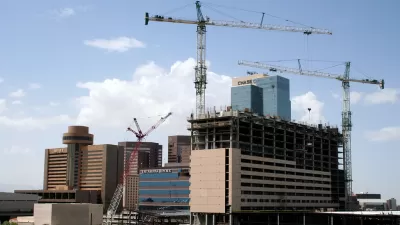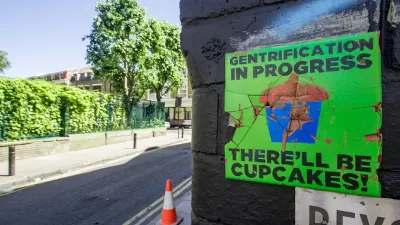Bruce Katz argues that federal investment in urban areas fosters a public/private ecosystem that can prioritize long-term thinking, minimizing the "short-termism" endemic to corporations and governments acting alone.

In a piece for Brookings, Bruce Katz argues that federal investment in cities could counter the short-term thinking common to elected officials and executives focused on quarterly earnings. From the article: "Washington assessments of the forces driving short-termism tend, not surprisingly, to lead to federal proposals to curb the practices of short-term actors. I suggest another approach: provide more support for the places—cities and metropolitan areas—that are already thinking and acting for the long term."
Unlike isolated federal or corporate actions, the urban environment necessitates cross-sector partnerships. "Cities do these things through a mix of investments by a broad range of public, private, and civic investors that cut across sectors as well as jurisdictional and disciplinary lines."
With this in mind, Katz suggests several ways Washington could support long-term solutions in cities, paraphrased below:
- Increase investments in basic science and applied research
- Locate satellites of isolated national energy and military labs near urban universities
- Use new credit enhancement tools around urban infrastructure to attract large-scale private investment
- Increase flexibility in federal grants to let leaders on the ground decide the uses with the highest impact
- Standardize and disseminate data on new instruments like social impact bonds or regional venture funds, letting city networks make smart decisions
FULL STORY: Are cities the cure for short-termism?

Maui's Vacation Rental Debate Turns Ugly
Verbal attacks, misinformation campaigns and fistfights plague a high-stakes debate to convert thousands of vacation rentals into long-term housing.

Planetizen Federal Action Tracker
A weekly monitor of how Trump’s orders and actions are impacting planners and planning in America.

Chicago’s Ghost Rails
Just beneath the surface of the modern city lie the remnants of its expansive early 20th-century streetcar system.

Bend, Oregon Zoning Reforms Prioritize Small-Scale Housing
The city altered its zoning code to allow multi-family housing and eliminated parking mandates citywide.

Amtrak Cutting Jobs, Funding to High-Speed Rail
The agency plans to cut 10 percent of its workforce and has confirmed it will not fund new high-speed rail projects.

LA Denies Basic Services to Unhoused Residents
The city has repeatedly failed to respond to requests for trash pickup at encampment sites, and eliminated a program that provided mobile showers and toilets.
Urban Design for Planners 1: Software Tools
This six-course series explores essential urban design concepts using open source software and equips planners with the tools they need to participate fully in the urban design process.
Planning for Universal Design
Learn the tools for implementing Universal Design in planning regulations.
planning NEXT
Appalachian Highlands Housing Partners
Mpact (founded as Rail~Volution)
City of Camden Redevelopment Agency
City of Astoria
City of Portland
City of Laramie





























